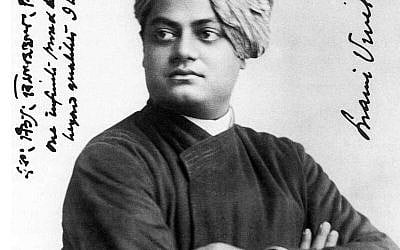On September 14th, I had the privilege of speaking at a day-long seminar organized by the Vedanta Society of Toronto, led by Swami Kripamayananda. The theme, “Infinite Potential,” resonated deeply with me—not just as a lifelong student but as someone captivated by the at times sublime intersection of diverse philosophical and spiritual traditions.
The seminar featured an impressive lineup of speakers, including mathematicians, educators, philosophers, and Vedanta scholars. Prof. Kumar Murty, author of The Science of Human Possibilities (which I am honored to have published), served as our gracious host. The diversity of perspectives was striking: I spoke about humility as the essence of human potential, while Prof. Donna Kotsopoulos offered a compelling case for desperation as its driving force.
As a parting gift, I received Romain Rolland’s The Life of Vivekananda and the Universal Gospel. This book illuminated intriguing parallels between Vedanta philosophy and Judaism, particularly in their shared belief in human potential and the divine spark within each individual.
Swami Vivekananda, a key figure in introducing Vedanta philosophy to the Western world, emphasized that recognizing and nurturing our potential is not merely a personal journey but a universal calling. This notion resonates strongly with Jewish teachings, especially the Talmudic concept of B’tzelem Elohim—the idea that every person is created in the image of G-d.
Both traditions stress the importance of self-realization and the pursuit of higher consciousness. In Vedanta, this is often described as recognizing one’s true nature as Atman (the individual soul) and its unity with Brahman (the ultimate reality). Judaism encourages a deep connection with the divine through study, prayer, and righteous action, even while maintaining a more defined separation between human and divine.
The concept of Tikkun Olam in Judaism—repairing the world—parallels Vivekananda’s call for selfless service and the betterment of humanity. Both philosophies view individual spiritual growth as inseparable from our responsibility to others and the world around us.

Swami Vivekananda, September, 1893, Chicago. Source: Wikipedia Commons (Public Domain)
Rolland’s remarkable book highlights Vivekananda’s universal approach, which sought common ground among different faiths. This inclusivity aligns with certain strands of Jewish thought, particularly within Chabad teachings that emphasize the divine spark within each person. Chabad principles speak to the soul’s three components: Nefesh (the animal soul), Ruach (the emotional soul), and Neshamah (the divine soul), revealing layers of connection to the divine that echo Vivekananda’s insights.
These threads remind us that our potential is indeed infinite—not just in terms of personal achievement but also in our capacity for understanding, compassion, and positive action.
The seminar embodied a spirit of open inquiry and shared wisdom. It served as a powerful reminder that exploring other traditions often leads us to new depths within our own.
In embracing our infinite potential—as both Vedanta and Judaism strongly encourage—we open ourselves to a profound truth: that the divine spark within us is not merely a personal asset but a universal light connecting us all. This connectivity reveals our shared infinite nature, reminding us that we are all part of a greater whole, indivisible and boundless in our collective potential.
If each of us were but a point on a circle—seemingly zero inside this vast universe—we’d still touch the infinite.
Neil Seeman is an author, educator, essayist, mental health advocate, and entrepreneur. Neil is CEO of publishing firm Sutherland House Experts. At the University of Toronto, Neil is an Adjunct Professor and senior fellow at the Institute for Health Policy, Management and Evaluation, the Fields Institute, the Investigative Journalism Bureau, Massey College, and the HIVE Lab. Neil founded technology and Big Data firm RIWI Corp. and he is the author or co-author of several books on mental health topics. He was a founding editorial board member of the National Post and co-founder of the Health Strategy Innovation Cell. Neil’s last book was "Accelerated Minds: Unlocking the Fascinating, Inspiring, and Often Destructive Impulses that Drive the Entrepreneurial Brain" (Sutherland House). Neil is a graduate of the University of Toronto Law School (JD) and the Harvard T.H. Chan School of Public Health (MPH).





No comments:
Post a Comment